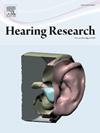慢性耳鸣与衰老有关,但与痴呆症无关。
IF 2.5
2区 医学
Q1 AUDIOLOGY & SPEECH-LANGUAGE PATHOLOGY
引用次数: 0
摘要
目的:衰老与身体和神经功能退化有关,会导致各种疾病和症状,包括老年痴呆症、听力损失或耳鸣。了解这些现象是如何交织在一起的以及衰老是如何影响这些现象的,对于预防和未来制定干预措施至关重要:我们利用了英国生物数据库,其中包括 502,382 名 40 至 70 岁的参与者。我们使用了逻辑回归模型和 cox 比例危险模型,并比较了危险比:结果:老年组(即 58 岁以上)报告耳鸣的几率增加了 53.6%,语言接收阈值每增加 1 分贝,耳鸣几率增加 13.0%。在有关听力损失的第二项分析中,语言接收阈值每增加 1 分贝,痴呆症的风险就会增加 14.0%。就衰老而言,每增加一岁,风险就增加 17.3%。耳鸣本身具有显著影响,其危险比为 52.1%,但如果加上听力损失、年龄和各种协变量,影响就会消失:研究结果证实,耳鸣确实与衰老有关,但可能独立于伴随痴呆症发展的衰老过程。这凸显了进一步研究衰老对神经过程的影响的迫切性,这些神经过程与听觉系统的改变(如导致耳鸣或听力损失的发生)以及神经退行性疾病脆弱性的增加有关。本文章由计算机程序翻译,如有差异,请以英文原文为准。
Chronic tinnitus is associated with aging but not dementia
Aim
Aging is related to deterioration of bodily and neural functions, leading to various disorders and symptoms, including the development of dementia, hearing loss, or tinnitus. Understanding how these phenomena are intertwined and how aging affects those is crucial for prevention and the future development of interventions.
Methods
We utilized the UK Biobank which includes a total of 502,382 participants between 40 and 70 years old. We used logistic regression models and cox proportional hazard models and compared hazard ratios.
Results
The odds of reporting tinnitus in the older age group (i.e., older than 58 years) were increased by 53.6 % and a one decibel increase in the speech-reception thresholds enhanced the odds for tinnitus by 13.0 %. For our second analysis regarding hearing loss, the risk of dementia increased by 14.0 % with an increase by one decibel in the speech-reception threshold score. In terms of aging, each additional year increased the risk by 17.3 %. Tinnitus alone showed a significant influence with a hazard ratio of 52.1 %, however, when adding hearing loss, age and various covariates, the effect vanished.
Conclusion
Findings confirm that tinnitus is indeed related to aging, but presumably independent of the aging processes accompanying the development of dementia. This highlights the urge to further investigate the impact of aging on neural processes that are relevant for alterations in the auditory systems (e.g., leading to the development of tinnitus or hearing loss) as well as for increased vulnerability in terms of neurodegenerative diseases.
求助全文
通过发布文献求助,成功后即可免费获取论文全文。
去求助
来源期刊

Hearing Research
医学-耳鼻喉科学
CiteScore
5.30
自引率
14.30%
发文量
163
审稿时长
75 days
期刊介绍:
The aim of the journal is to provide a forum for papers concerned with basic peripheral and central auditory mechanisms. Emphasis is on experimental and clinical studies, but theoretical and methodological papers will also be considered. The journal publishes original research papers, review and mini- review articles, rapid communications, method/protocol and perspective articles.
Papers submitted should deal with auditory anatomy, physiology, psychophysics, imaging, modeling and behavioural studies in animals and humans, as well as hearing aids and cochlear implants. Papers dealing with the vestibular system are also considered for publication. Papers on comparative aspects of hearing and on effects of drugs and environmental contaminants on hearing function will also be considered. Clinical papers will be accepted when they contribute to the understanding of normal and pathological hearing functions.
 求助内容:
求助内容: 应助结果提醒方式:
应助结果提醒方式:


